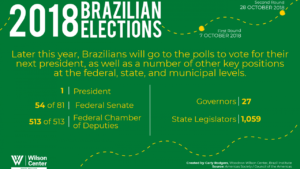
Wilson Center
The victory of the right-wing Jair Bolsonaro in Sunday’s runoff presidential election in Brazil will improve prospects for placing pressure on the authoritarian ‘Cubazuela’ axis, observers suggest.
At the very least, he will end the use of the state-owned oil giant, Petrobras, to “subsidize the military dictatorships in Cuba and Venezuela”, says Wall Street Journal analyst Mary Anastasia O’Grady.
Bolsonaro pledged to realign Brazil with more advanced economies rather than regional allies, overhauling diplomatic priorities after nearly a decade and a half of leftist rule, Reuters reports:
Brazil would seek to improve trade relations outside the restrictions of the Mercosur bloc founded with neighboring Argentina, Uruguay and Paraguay. Bolsonaro’s rise follows conservative electoral victories in Argentina, Chile, Colombia, Paraguay, and Peru, pushing the continent to the right and undermining support for the authoritarian socialist regime in Venezuela.

Wilson Center
Bolsonaro railed against Cuba and Venezuela during his election campaign, painting Brazil’s Workers’ Party as their ideological allies. So observers should anticipate “a much tougher line against Venezuela and Cuba,” according to Brian Winter, editor-in-chief of Americas Quarterly magazine and the vice president for policy at Americas Society/Council of the Americas.
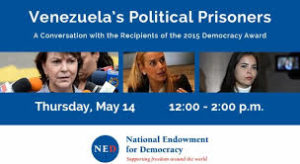 Nonetheless Venezuelan President Nicolas Maduro, who survived an assassination attempt in August, faces no immediate political crisis at home, The FT adds:
Nonetheless Venezuelan President Nicolas Maduro, who survived an assassination attempt in August, faces no immediate political crisis at home, The FT adds:
With the help of Cuban advisers, he appears to control the military and is set to win what will certainly be rigged municipal elections in December. The following month he will formally begin another presidential term — the consequence of a sham election victory in May.
Cuba has helped make Venezuela a “mafia state”, reports suggest.
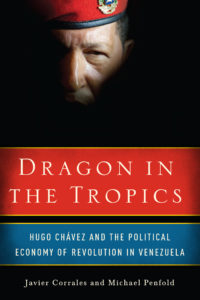 The late President Hugo Chávez initiated the cooperation program with Cuba, which at one point cost Venezuela more than $5 billion per year, and also paid for Cuban assistance with intelligence and national security issues, according to documents from the U.S. State Department and Stratfor, a private intelligence agency, The Miami Herald reported.
The late President Hugo Chávez initiated the cooperation program with Cuba, which at one point cost Venezuela more than $5 billion per year, and also paid for Cuban assistance with intelligence and national security issues, according to documents from the U.S. State Department and Stratfor, a private intelligence agency, The Miami Herald reported.
“The capacity of Venezuelan intelligence got a strong push after Chávez allied with Cuba,” one Stratfor analyst wrote. “That’s the reason why Chávez is in debt with (Cuba). … His regime can detect every plot beforehand and keep watch on the opposition because of the large number of Cubans involved in intelligence collection.”
“What we must remember is that SEBIN (Venezuela’s intelligence service) has never been as effective if not for the Cubans. If Cuba at some point decides to withdraw its cooperation, Chávez would have to quickly develop an intelligence capability, because otherwise he would be in trouble,” the analyst added.
Cuba and Venezuela have collaborated in disrupting civil society, including activists supported by the National Endowment for Democracy, among other democracy assistance groups. But now…
Cuba is alone. For almost the first time in its history — as a colony of Spain, a supposed satrap of the US and Soviet satellite, and most recently as a recipient of Venezuelan aid — it lacks an economic patron, according to a recent FT analysis:
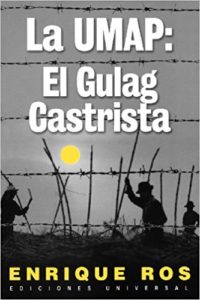 Cuba’s economy, hit by Hurricane Irma and a near-halving of aid from Venezuela, remains on the rocks. Despite reforms launched by Mr Castro 10 years ago when he became president, which have led to the creation of 580,000 privately self-employed businesses, the economy is a third smaller than it was in 1985, according to a study led by Pavel Vidal, a Cuban economist teaching at Javeriana University in Colombia.
Cuba’s economy, hit by Hurricane Irma and a near-halving of aid from Venezuela, remains on the rocks. Despite reforms launched by Mr Castro 10 years ago when he became president, which have led to the creation of 580,000 privately self-employed businesses, the economy is a third smaller than it was in 1985, according to a study led by Pavel Vidal, a Cuban economist teaching at Javeriana University in Colombia.
Cuba’s foreign minister was outraged to discover that the U.S. has moved to complicate the UN’s annual Cuban-led condemnation of America, through a series of eight amendments tabled by Washington that would turn the tables on the regime by spotlighting Havana’s human rights abuses,.UN Watch adds:
Every year Cuba initiates a UN resolution condemning the U.S. for its embargo on Cuba, and generating a lengthy report with submissions by numerous states and UN agencies. This year, however, the UN will be obliged to also consider new language redirecting the focus to Cuba’s “complete absence of judicial independence,” “arbitrary arrests and detentions,” “the absence of women from the most powerful decision-making bodies,” as well as its “prohibition on the right to strike,” and denial of “civil, political and economic rights and freedoms, including freedom of assembly, freedom of expression and free access to information.”
“For the first time in more than a decade, the United Nations will now consider a draft resolution focusing on the oppression of the Cuban people by its own dictatorial regime,” said Hillel Neuer, executive director of the Geneva-based UN Watch, a non-governmental human rights group that has been a leading voice at the world body for Cuban dissidents.
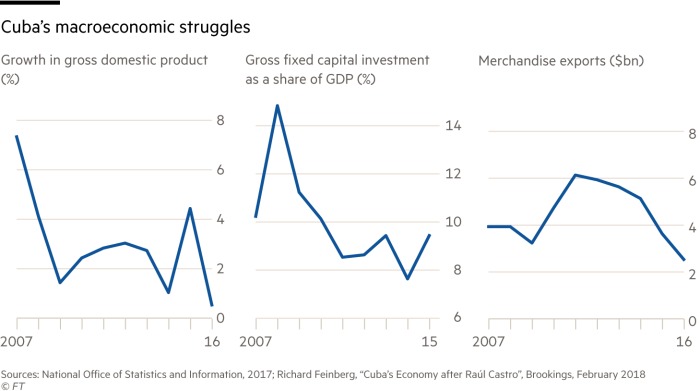
FT.COM







